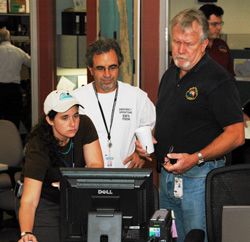It's a New Day in Public Health.
The Florida Department of Health works to protect, promote, and improve the health of all people in Florida through integrated state, county, and community efforts.
Ten Ways to Stay Informed—Your Guide to Emergency Preparedness Information
October 02, 2013

Hurricanes and other disasters can develop rapidly, especially in Florida, and it’s important to stay “in the know” to ensure your health and safety. Below are 10 suggested ways to stay informed before, during and after an emergency (listed in alphabetical order):
- Assistance agencies such as the American Red Cross, Federal Emergency Management Agency (FEMA) and Florida Volunteer and Donations Hotline regularly provide information on what resources are available in your area and accessible to you. For additional information, access your county emergency management agency at www.floridadisaster.org/County_EM/county_list.htm.
- Business websites and social media pages can inform you on what stores are open in your area before, during and after an emergency.
- Florida’s Health and Emergency Management officials will provide up-to-date information on emergency conditions, and also inform residents on the status of shelter openings in the area. To view a list of county health departments in Florida. Also, visit www.floridadisaster.org.
- National Hurricane Center (NHC)—www.nhc.noaa.gov—allows site visitors to sign up for updates and alerts on weather conditions.
- National Oceanic and Atmospheric Administration (NOAA)—www.noaa.gov/—provides daily forecasts and severe storm warnings. Emergency alerts and information are also available via NOAA Weather Radio All Hazards broadcasts. Click here for a list of all the NOAA Weather Radio All Hazards stations in the United States.
- National Weather Service (NWS)—www.weather.gov/—is a component of NOAA and provides additional information.
- Networks of family and friends can also serve as trusted sources for information and should be a part of your emergency plan. Discuss in advance planned evacuation and travel routes as well as safe places to meet up in the event of an emergency with family and friends.
- Other trusted weather news sources like the Weather Channel provide an overall view of current and future weather conditions.
- Radio or television news—State and local officials use these mediums to provide emergency-related information on how a storm or disaster will impact your area.
- Social media sites like Twitter, Facebook, etc. can be a source for quick updates on weather and disaster conditions. Be sure to follow only trusted media and weather sources in the event of an emergency.
These are just some of the many options you can use to stay informed before, during and after an emergency. For more information on emergency preparedness, visit the Florida Department of Health’s website, www.floridahealth.gov or Florida Division of Emergency Management at www.floridadisaster.org.
Haven’t created a family emergency plan yet? It’s not too late! Check out the Florida Department of Health’s Florida Emergency Preparedness Guide, available in multiple languages and formats to all residents and visitors at www.floridahealth.gov. Follow the Florida Department of Health on Facebook and on Twitter at @HealthyFla.




Connect with DOH